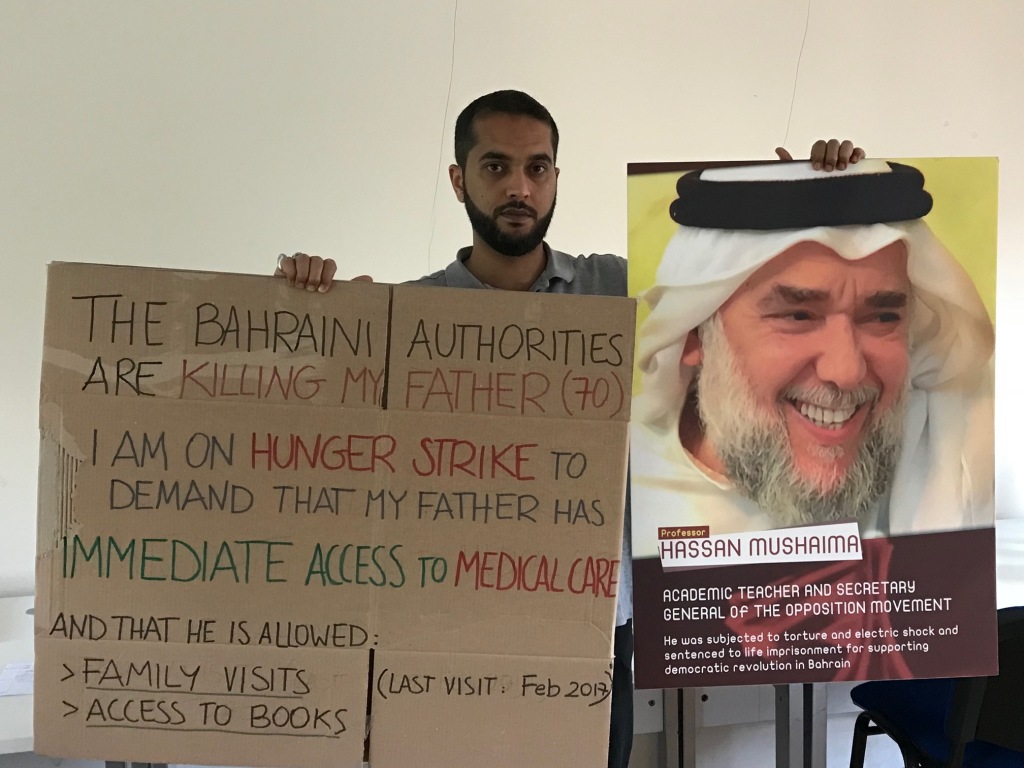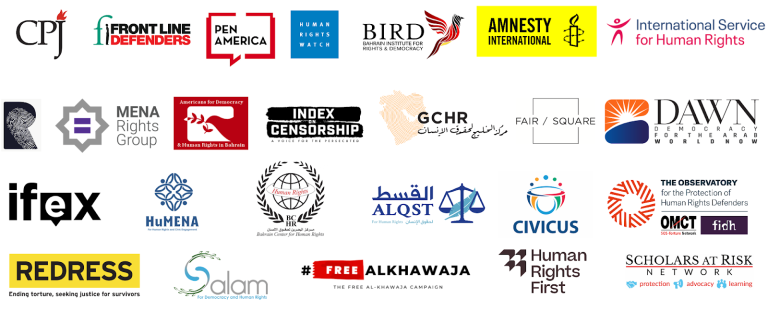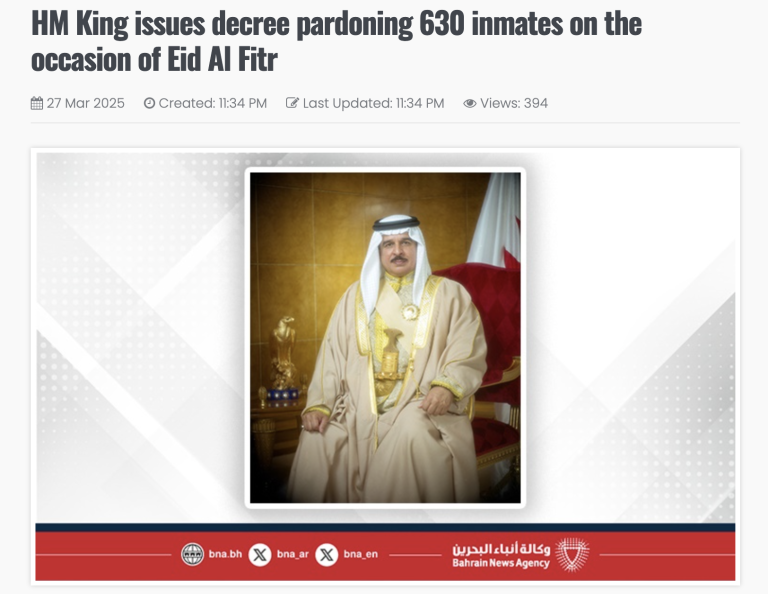Americans for Democracy & Human Rights in Bahrain (ADHRB), the Bahrain Institute for Rights & Democracy (BIRD), and the European Centre for Democracy & Human Rights (ECDHR) call on the Bahraini authorities in Jau Prison to provide the medication that Mr. Mushaima requires for multiple chronic illnesses, and ensure the rights and humane treatment of prisoners of conscience in Bahrain.
Hassan Mushaima was previously the Secretary-General of the Haq Movement for Liberty and Democracy and is the Co-founder and former Vice President of al-Wefaq National Islamic Society, the largest political opposition group, which the government of Bahrain dissolved in 2016. He was sentenced for “attempting to overthrow the government,” for his role in the pro-democracy protests in 2011. He is currently serving a life sentence on these political charges, and has been subjected to ill-treatment in Jau Prison, including the continued denial of healthcare and restricted access to medication by the prison administration.
Mushaima, 70 years old, suffers from a myriad of chronic medical conditions, including cancer, diabetes, high blood pressure, and gout. His cancer is in remission, but he requires regular screenings to ensure that it has not returned, every six months. However, the prison authorities have consistently restricted his access to these crucial screenings. The United Nations Special Rapporteur on health raised Mushaima’s case with the Government of Bahrain, in April 2014. The government responded that their agencies “provide[] health care for all prison inmates without discrimination,” and that prisoners who require follow up medical care will be provided this, in hospitals and with specialists. However, in a one-year span, he only saw one specialist, and his chemotherapy was not consistently administered. He has not been screened for cancer since September 2016. Further, he has not seen any physician since March 2017.
In addition to denying Mushaima access to medical care, the prison authorities have also begun to deprive him and other political prisoners of necessary medication for their ailments. Mushaima has not received his medication for diabetes and high blood pressure on a consistent basis since August 2017. He reports that prisoners often have to borrow medication from one another when prison officials skip dosages or provide a lower dose than is required. The prison authorities failed to provide Mushaima with medication for his diabetes for more than a month during November and December 2017. He reported on 29 July 2018 that he has entirely depleted his supply of medication for his diabetes, and must now rely on insulin shots to regulate his blood sugar levels.
The prison authorities have recently informed Mushaima and other political prisoners that they will only receive medication or be taken to appointments if they will go in full shackles—a measure that is entirely punitive and degrading to these peaceful political prisoners. In addition to these restrictive measures, Mushaima has not had a family visit since February 2017, when the prison authorities arbitrarily instated the practice of shackling prisoners during family visits. Further, Mushaima and other prisoners of conscience have not been able to access the prison commissary since March 2017. They have also not been permitted to receive clothes, undergarments, soap, razors, and other hygiene products from outside the prison; combined with the commissary ban, prisoners have no access to hygiene products or other essentials. In October 2017, the prison authorities subjected Mushaima and other inmates to an unnecessary search and inspection, during which all personal items, including religious books, notes, and phone cards were arbitrarily confiscated.
In response to this continued denial of health care and medication, his son Ali Mushaima started a hunger strike outside of the Bahraini embassy in London on 1 August 2018. Ali says that he will remain there and continue his hunger strike until the Bahraini authorities provide his father with medical care, permit him to have family visits unencumbered by shackles, and return his books. The Bahraini Embassy in the UK responded to questions raised by a British parliamentarian relating to his protest by denying any wrongdoing and claiming that Mushaima receives medication regularly, though Mushaima and his family claim this to be utterly false and misleading.
“The Bahraini government is holding medical care hostage, in order to subject these political prisoners and human rights defenders to degrading and humiliating treatment,” says Husain Abdulla, Executive Director of ADHRB. “The use of shackles on a non-violent political prisoner who is 70 years of age with multiple medical conditions can serve no purpose other than to punish him for his political activities and to subject him to further ill-treatment. This appalling treatment is not only in violation of international law, but left unchecked, could prove fatal for Hassan Mushaima and other prisoners with serious medical conditions.”
ADHRB has submitted multiple complaints and requests for assistance on behalf of Mushaima to both the Ministry of Interior (MoI) Ombudsman and the Bahraini National Institution for Human Rights (NIHR). Neither institution has taken any action to remedy the situation or provide care to Mushaima. The United Nations Committee Against Torture has previously called into question the impartiality of the MoI Ombudsman noting its concern about the Ombudsman’s activities having “little or no effect, and that the authorities provided negligible information regarding the outcome of their activities.” In June 2018 the European Parliament passed a resolution in which they stated that the NIHR “has repeatedly justified the human rights violations undertaken by the Bahraini Government.” The following month the UN Human Rights Committee noted that it too was, “concerned that the NIHR lacks sufficient independence to perform its functions and regrets the lack of information on complaints received and investigations carried out in response to these complaints.”
“Every action that the Jau administration has taken has been to deepen the suffering of peaceful political prisoners,” says Sayed Ahmed AlWadaei, Director of Advocacy at BIRD. “For the government of Bahrain, it is not enough that these individuals are serving life sentences in violation of international laws and standards. They also subject them to inhumane treatment, deny them medical care, prevent them from seeing their families, and prevent them even from reading books. Their so-called human rights institutions and oversight mechanisms further fail to address these rights violations, with the UK-backed Ombudsman and NIHR offices ignoring multiple requests and providing blanket endorsements of the government and prison’s bad acts.”
ADHRB, BIRD, and ECDHR call on the Government of Bahrain to immediately reinstate regular access to medical care and medication for all detained individuals. Further, we call for the government to release Mr. Mushaima and all other political individuals who have been convicted in violation of their rights to freedom of expression and assembly. Finally, we call on the authorities in Jau Prison to end the degrading practice of requiring full shackles in order to receive medical care or familial visits.





